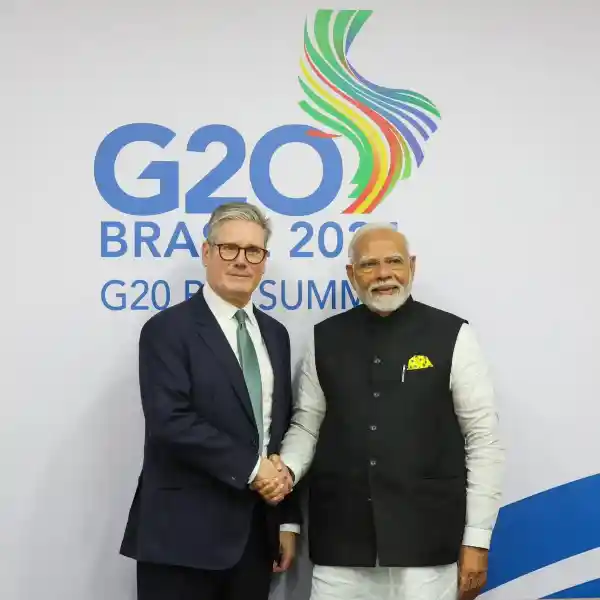British Prime Minister Keir Starmer has called the upcoming Free Trade Agreement (FTA) with India a “major win” for the UK economy. The deal, expected to be signed during his meeting with Prime Minister Narendra Modi at Chequers, will significantly cut tariffs on various goods including clothing, footwear, and food. This move is set to lower prices for British consumers while boosting trade between the two nations.
£6 Billion in New Investments and Export Wins
As part of the broader economic cooperation, nearly GBP 6 billion in new investments and export agreements have been confirmed. These developments include the expansion of Indian companies in the UK and increased business opportunities for British firms in India.

New Strategic Partnership to Deepen Bilateral Ties
The leaders will also renew a Comprehensive and Strategic Partnership aimed at enhancing cooperation in areas such as defence, education, climate action, and innovation. This is expected to further solidify UK-India relations beyond trade.
Tariff Reductions to Benefit Key Sectors
The UK Department for Business and Trade (DBT) has detailed that India’s average tariffs on UK goods will drop from 15% to 3% under the new FTA. This change will benefit a range of industries, including cosmetics, soft drinks, cars, and medical devices.
One of the biggest winners is the whisky industry, with tariffs cut immediately from 150% to 75%, and gradually down to 40% over 10 years. This move positions UK whisky producers advantageously in the Indian market.
Nationwide Economic Impact Across the UK
UK Business and Trade Secretary Jonathan Reynolds emphasized that the trade deal will deliver economic gains across all regions of the UK. Official analysis estimates the FTA will boost the UK’s GDP by GBP 4.8 billion annually in the long term.
Key manufacturing sectors are set to benefit:
- Aerospace tariffs will be reduced from 11% to 0%
- Automotive tariffs will be cut from 110% to 10% under a quota
- Electrical machinery tariffs will drop from 22%
Major Gains in UK Exports and Bilateral Trade
The FTA is expected to increase UK exports to India by nearly 60% in the long run, adding up to GBP 15.7 billion by 2040. Bilateral trade is forecast to rise by nearly 39%, reaching GBP 25.5 billion a year when compared to projections without the agreement.
Clean Energy and Financial Services to See Expansion
The deal opens up new opportunities in India’s clean energy sector, providing UK firms access to India’s procurement markets amid the country’s shift to renewable energy.
In financial and professional services, the agreement will secure access for UK companies and ensure they are treated equally to Indian firms. It also includes commitments like locking in India’s foreign investment cap for the insurance sector.
New Business Opportunities for British Firms
Twenty-six British companies have already secured new business deals in India. Airbus and Rolls-Royce will soon begin delivering aircraft to India, with more than half powered by Rolls-Royce engines.
Enhanced Cooperation on Security and Migration
Alongside economic agreements, the UK and India will strengthen collaboration on security matters, including joint efforts to combat corruption, serious fraud, organised crime, and irregular migration through improved intelligence sharing and operational support.
